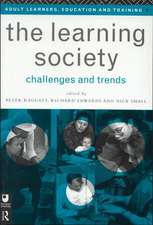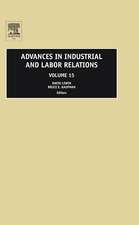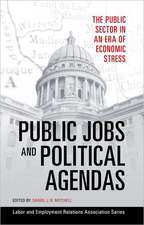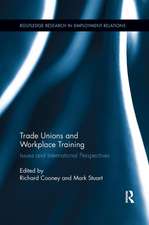Rights at Work: Employment Relations in the Post-Union Era
Autor Richard Edwardsen Limba Engleză Paperback – mai 1994
With growing international competition, American firms have been gaced with increasing pressures to produce better products, cut costs, and improve efficiency. As a result, American employers have changed many of their long-standing labor priorities. Work-force stability has become less important; long-term commitments have become less attractive; and labor costs, especially fringe benefits, have come under increased scrutiny. With this large reorganization of work forces and priorities, Americans are again faced with the significant questions of what rights workers have—and should have—in the workplace.
In the current environment, employers have a greater need for highly motivated, hard-working, skilled employees, and have often developed innovated forms of management to enlist these worker's support. So too, national legislation has granted workers new rights in recent years, such as mandatory early notification of plant closings, greater rights for workers with disabilities, and increased protection for older workers. State legislators have also enacted expanded protection for workers, and state courts have been rewriting basic legal doctrines governing workers' rights in ways that favor employees.
In this book, Richard Edwards explores workers' rights and the institutions that have defined and are now enforcing them. He looks closely at the decline of American unions and its effect on traditional rights. As unions have been transformed from major institutional players in the American economy to much more marginal brokers enrolling only a small minority of American workers, political support for workers' rights has diminished. Edwards also traces the American state courts' and the ongoing revision of the legal interpretations of employment contracts and employers' promises, a development which he believes may revolutionize traditional employment law.
Rights at Work cuts through the debate between employers' groups and workers' advocates to find a new common ground. Edwards argues that a new system of employment relations offers a "win-win" opportunity, and he proposes some innovative public policy strategies that could protect workers' rights while enhancing employers' ability to succeed in a highly competitive global market.
In the current environment, employers have a greater need for highly motivated, hard-working, skilled employees, and have often developed innovated forms of management to enlist these worker's support. So too, national legislation has granted workers new rights in recent years, such as mandatory early notification of plant closings, greater rights for workers with disabilities, and increased protection for older workers. State legislators have also enacted expanded protection for workers, and state courts have been rewriting basic legal doctrines governing workers' rights in ways that favor employees.
In this book, Richard Edwards explores workers' rights and the institutions that have defined and are now enforcing them. He looks closely at the decline of American unions and its effect on traditional rights. As unions have been transformed from major institutional players in the American economy to much more marginal brokers enrolling only a small minority of American workers, political support for workers' rights has diminished. Edwards also traces the American state courts' and the ongoing revision of the legal interpretations of employment contracts and employers' promises, a development which he believes may revolutionize traditional employment law.
Rights at Work cuts through the debate between employers' groups and workers' advocates to find a new common ground. Edwards argues that a new system of employment relations offers a "win-win" opportunity, and he proposes some innovative public policy strategies that could protect workers' rights while enhancing employers' ability to succeed in a highly competitive global market.
Preț: 201.02 lei
Nou
Puncte Express: 302
Preț estimativ în valută:
38.47€ • 41.77$ • 32.31£
38.47€ • 41.77$ • 32.31£
Carte tipărită la comandă
Livrare economică 22 aprilie-06 mai
Preluare comenzi: 021 569.72.76
Specificații
ISBN-13: 9780815721055
ISBN-10: 0815721056
Pagini: 265
Dimensiuni: 152 x 229 x 21 mm
Greutate: 0.39 kg
Ediția:Revised
Editura: Brookings Institution Press
Colecția Brookings Institution Press
ISBN-10: 0815721056
Pagini: 265
Dimensiuni: 152 x 229 x 21 mm
Greutate: 0.39 kg
Ediția:Revised
Editura: Brookings Institution Press
Colecția Brookings Institution Press
Notă biografică
By Richard Edwards
Descriere
With growing international competition, American firms have been gaced with increasing pressures to produce better products, cut costs, and improve efficiency. As a result, American employers have changed many of their long-standing labor priorities. Work-force stability has become less important; long-term commitments have become less attractive; and labor costs, especially fringe benefits, have come under increased scrutiny. With this large reorganization of work forces and priorities, Americans are again faced with the significant questions of what rights workers have—and should have—in the workplace.
In the current environment, employers have a greater need for highly motivated, hard-working, skilled employees, and have often developed innovated forms of management to enlist these worker's support. So too, national legislation has granted workers new rights in recent years, such as mandatory early notification of plant closings, greater rights for workers with disabilities, and increased protection for older workers. State legislators have also enacted expanded protection for workers, and state courts have been rewriting basic legal doctrines governing workers' rights in ways that favor employees.
In this book, Richard Edwards explores workers' rights and the institutions that have defined and are now enforcing them. He looks closely at the decline of American unions and its effect on traditional rights. As unions have been transformed from major institutional players in the American economy to much more marginal brokers enrolling only a small minority of American workers, political support for workers' rights has diminished. Edwards also traces the American state courts' and the ongoing revision of the legal interpretations of employment contracts and employers' promises, a development which he believes may revolutionize traditional employment law.
Rights at Work cuts through the debate between employers' groups and workers' ad
In the current environment, employers have a greater need for highly motivated, hard-working, skilled employees, and have often developed innovated forms of management to enlist these worker's support. So too, national legislation has granted workers new rights in recent years, such as mandatory early notification of plant closings, greater rights for workers with disabilities, and increased protection for older workers. State legislators have also enacted expanded protection for workers, and state courts have been rewriting basic legal doctrines governing workers' rights in ways that favor employees.
In this book, Richard Edwards explores workers' rights and the institutions that have defined and are now enforcing them. He looks closely at the decline of American unions and its effect on traditional rights. As unions have been transformed from major institutional players in the American economy to much more marginal brokers enrolling only a small minority of American workers, political support for workers' rights has diminished. Edwards also traces the American state courts' and the ongoing revision of the legal interpretations of employment contracts and employers' promises, a development which he believes may revolutionize traditional employment law.
Rights at Work cuts through the debate between employers' groups and workers' ad























